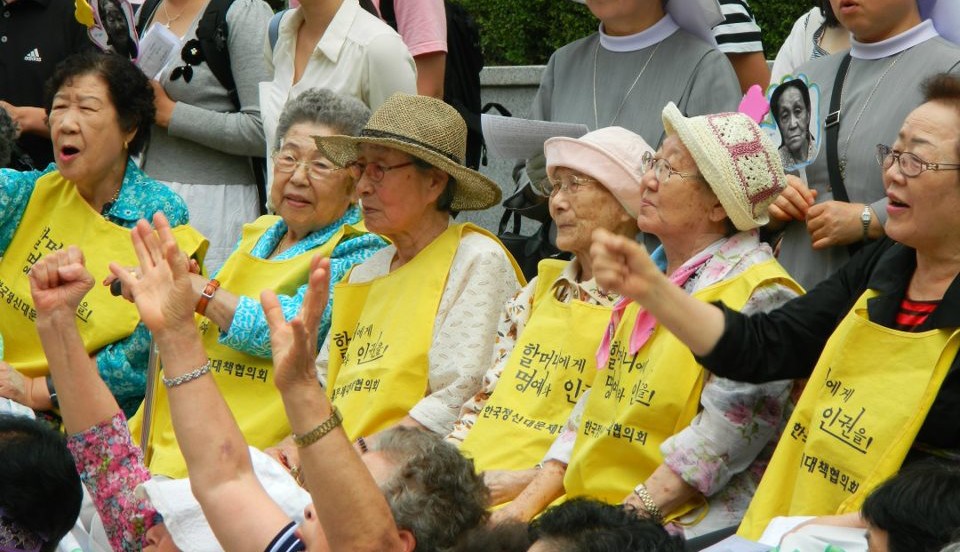The death of Lee Yong-nyeo, who was 87 years old when she passed away last month in South Korea, has renewed concerns that former comfort women may not live to receive an official and sincere apology from the Japanese government. Lee was one of many teenage girls who were forced to provide sex for Japanese soldiers during World War II. Out of the 234 Korean women who initially came forward in the early 1990s, only 57 remain, most of them now in their late 80s. While former war aggressor Germany has been able to issue a successful apology to victims of its crimes and to restore ties with Israel and Europe’s Jewish community, in the same number of years since 1945, the Japanese government has yet to do the same for the victims of its war crimes.
In the past few years, a wave of strong, nationalistic conservatism in the highest ranks of Japan’s political structures has hindered any constructive discussion of the country’s role in WWII. Politicians such as Prime Minister Shinzo Abe, who are mostly in their 50s and 60s, are part of Japan’s first post-WWII generation. The nationalistic fervor flowing through some of them is characterized by hawkish rhetoric and a denial of wartime wrongdoings. Abe’s platform, an example of contemporary right-wing nationalism in Japan, features an aggressive stance on territorial disputes in the East China and Japan Seas, questions and denies the realities of Japan’s colonial past, and most controversially, seeks constitutional revisions that would allow for a buildup of defensive forces.

While such strong nationalism was previously limited to fringe parties, it now concerns the platforms of top politicians of the ruling Liberal Democratic Party and other popular parties, such as the Japan Restoration Party (JRP). This change repositions Japan as a threat to its neighbors, primarily China and Korea. Japan’s imperialist past largely shapes popular opinion about the country among younger Chinese and Koreans and is remembered vividly by the few who are old enough to have lived through it. Some politicians’ remarks, particularly those made in response to the comfort women issue, have not helped to mitigate concerns about the hyper-nationalistic aspects of their policy platforms. China, Korea, and the Philippines criticized repeated comments by Osaka mayor Toru Hashimoto of the JRP, who last year claimed that there is no evidence that the imperial military forcibly enslaved women as sex workers, but only a few months ago appeared to have revised his position to instead admit to the use of comfort women. He defended the comfort women program as a measure to provide rest for exhausted and sexually deprived soldiers. Concerns about Japan’s very nationalistic right were further intensified with Abe’s questioning of the same evidence.
The unprecedented spike in post-war Japanese nationalism, surfacing in the midst of economic stagnation, seems to be partially based on moralist appeals. Abe’s slogan for his second successful campaign for prime minister was “Restoring Japan.” This resonated with right-leaning voters who were dissatisfied with the failure of the previously ruling Democratic Party of Japan to maintain a cohesive party line on important national policies and hoped that the more united LDP would not only help improve Japan’s economy but also restore the country’s past dominance in Asian politics.
The Japanese government seems to undervalue an apology as a mere symbolic gesture and a humiliating concession of weakness. Yet, to see how large of a positive effect an official, sincere apology can have on its diplomatic standing, it can find an example in Germany, which one could say has rid itself of its Nazi past through a series of sincere apologies and apologetic actions and is now engaged in relatively healthy partnerships with its European neighbors. Not only would apologizing to comfort women dignify surviving victims, it might also improve Japan’s foreign relations. Distrust and hostility toward Japan, rooted in memories of its crimes against humanity and emphasized today by its far right and territorial disputes, stand in the way of normalized partnerships with other Asian nations.
While Japanese politicians have issued several apologetic statements in the past, they have either been selective or entirely ineffective. In 1965, the government offered financial reparations to war victims in Korea, but comfort women were exempt from such compensation, leaving them deprived of both moral and financial resources to cope with their suffering. For almost two decades, former comfort women in Korea have protested in front of the Japanese embassy in Seoul. Their specific set of demands includes the creation of a memorial in Japan, full disclosure of details regarding the comfort women program, and an apology from the emperor. Potentially legitimate apologies have been ineffective due to high levels of domestic backlash from nationalist groups. There are hundreds of nationalist right-wing groups in Japan today that regularly drive black trucks bearing the Japanese flag around Chinese and Korean embassy and other organizational buildings, blasting the national anthem from megaphones. From the perspective of the Japanese government, an apology is not worth explosive reactions from these groups. The state’s advocacy of school textbooks that downplay and omit parts of Japanese imperial history does not help either. The prevailing opinion in Japan is that there is no need for today’s politicians to apologize for historical crimes.
What should an apology look and sound like? For one thing, it must be unambiguous. Remorse should be evident both Diet-wide and countrywide. Likewise, Japan’s populace needs to commit to making a remorseful sentiment a national norm. In order for the apology to have any kind of diplomatic influence, it must fulfill two semantic components: it must acknowledge and regret the specific crimes and their repercussions, and it must claim responsibility for the perpetration of such crimes. Historically, unsuccessful apologies have only fulfilled one of these two components. For example, President Bush’s statement on the Abu Ghraib prisoner torture scandal recognized the pain and humiliation of the Iraqi prisoners but failed to identify the United States as responsible for the abuses. Needless to say, the Iraqi media did not accept his apology and the public responded with more hostility. To avoid such a situation, Japan would have to call a summit solely dedicated to the discussion of its crimes against its East Asian neighbors. Engaging in constructive, productive dialogue with victims might ensure that an apology is accepted as sincere. As of now, there appears to be no attempt by Japanese leaders to engage in talks with Chinese or Korean leaders about historically charged issues.
The proverb “actions speak louder than words” is perhaps most applicable to this situation. While there is nothing wrong with a predominantly rightist mood, its rise amidst ongoing territorial disputes between Japan and its neighbors is problematic. And while Japan adopted a pacifist constitution after the war, Abe’s suggestion that it be revised has made neighbors uneasy. Likewise, as of now, any apology regarding comfort women and other war crimes seems insincere, as the prime ministers of Japan continue to visit the Yasukuni shrine to pay their respects to soldiers buried there alongside Class A war criminals.
